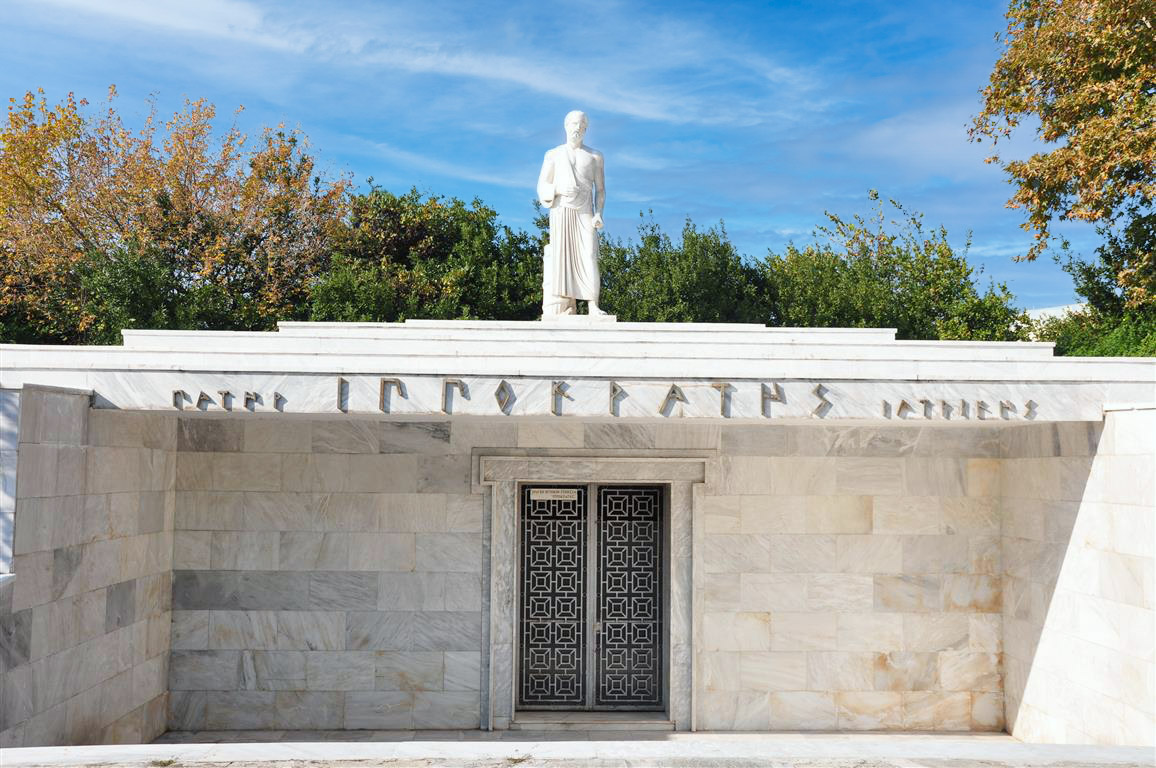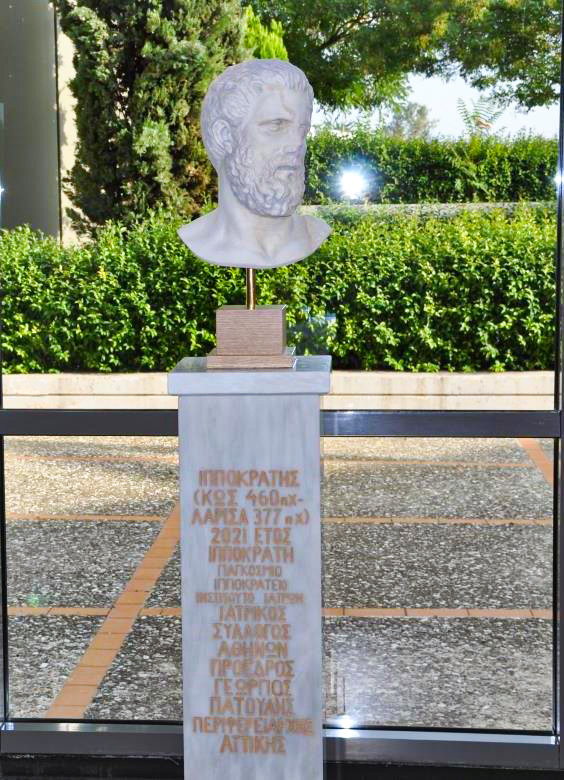Few historical data about Larissa, Thessaly and Hippocrates
Thessaly presents a long and interesting relationship with the history of Medicine . In Pelion, according to Mythology, lived the Healer Centaur Hands. The 2nd millennium BC is dominated by Asclepius, the god of Medicine. It is believed that Asclepius traces his origins from Thessaly and for this reason he established the first Asclepieion in Trikki in the 16th century BC. To date, 12 Asclepieia have been located and identified in Thessaly. One of them was found in Gonos at a distance of less than 20 kilometers from Larissa.
During the 4th century BC, when the kingdom of the Alevads was prospering in Larissa, Hippocrates, the founder of scientific observation, settled in Larissa. Hippocrates refuted the beliefs of antiquity "about disease" as a "curse" of the gods, introduced the description of the symptoms, signs and course of the disease and described therapeutic and surgical interventions on patients.
Hippocrates came from Kos and was the son of Heraclides and Phenaretus, while his generation was rumored to be related to Hercules and Asclepius. He was born in the first year
4
of the eightieth Olympiad and practiced his profession mainly during the period of the Peloponnesian War. He was a student of his father, who was also a physician, of the physician Herod, Gorgias, Leontinos and the philosopher Democritus. After training in medicine, Hippocrates began to practice medicine in Kos. However, knowing the ignorance and prevention that prevailed among the doctors of their time, he decided to travel to other places and to complete his education but also to spread his faith in the fresh air, water and sun. For this reason, he left his homeland with the intention of observing what was happening in other places and to practice more scientifically. In fact, Soranos mentions that in a dream he was suggested to live in Thessaly.
Practicing Medicine all over Greece, his fame spread very quickly. He won the admiration of many, as a result of which the king of Macedonia Perdikkas (who was considered to be tuberculous = tuberculosis) invited him to serve as his personal physician together with the also physician Evryfonas. He lived for years in Macedonia and was associated with a strong friendship with King Perdikkas. The inhabitants of Abdera in Thrace asked him to cure the philosopher Democritus and save their city from the plague. When a plague broke out in the barbarian areas of Illyria and Peonia, their kings begged him to go to their country but Hippocrates refused to go to a barbaric country. However, when he heard the information from the ambassadors of the barbarians and was informed about the course of the winds (of their areas), he estimated that the plague could reach as far as Attica, and warned of what was to happen, taking care of the cities and his students.
The fame reached as far as Persia and the Persian king Artaxerxes invited him, through the commander of the Hellespont Ystanus, to come to his country promising rich gifts. Hippocrates, however, refused, since he was modest and patriotic, but not greedy at all. Apart from his medical work, he saved his homeland from war with Athens, begging the Thessalians to help it. He was honored with brilliance by the Kos but also by the Thessalians, the Argians and the Athenians.
During his travels, Hippocrates taught and recorded his observations and theories. After his death, his work was collected and became what is known as the "Hippocratic Collection", a total of 60 works (Six Hundred Books) which contain textbooks, lectures, research, notes and philosophical essays on various topics in the field of Medicine. Among them it is worth mentioning the Oath, which is a timeless rule of medical ethics and deontology, with the basic principles that should govern the operation of the doctor..
His other works: The Law, About Ancient Medicine, About Anatomy, About the Heart, About Food, About Air, Water, Places, About Nature, Forecast, About Epidemics, About Face, About Dentistry, etc.
His last stop was the land of his ancestors, Thessaly , where he remained until the end of his life. He died in Larissa in 377 BC, at the age of 83, and was buried somewhere between Gyrtonos, Tyrnavos and Larissa.

The Monument of Hippocrates’ tomb in Larissa

Copy of the bust found in the Archaeological Museum of Kos - Donated by the World Hippocratic Institute of Physicians (ground floor of the Medicine building)
Connection with Hippocrates
The Faculty of Medicine of the University of Thessaly has the honor to be located in the geographical area where Hippocrates, who is considered the "father of Medicine", practiced Medicine, passed away and was buried. This relationship led to the cooperation of the Faculty of Medicine with the association "Hippocrates in Larissa" as well as with the Medical Association of Larissa "Hippocrates", the Municipality of Larissa and the Region of Thessaly in order to promote the Hippocratic tradition and spirit in local and nationwide level. Since 2015, various events have been organized in order to spread the Hippocratic idea and to highlight the city of Larissa as the city of Hippocrates. In this context, the cooperation with the International Hippocratic Foundation in Kos has been achieved, while the participation of associations and clubs related to the father of Medicine, Hippocrates, from European countries (France, China, USA, etc.) is attempted. All these events are part of a set of activities of the Faculty, in collaboration with all the above social and cultural bodies, in a spirit of extroversion and interaction with society.
In particular, the events "THE ETERNAL RETURN OF HIPPOCRATES TO LARISSA" in September 2021 included taking the oath of Hippocrates by Medicine graduates for the first time at the 2nd Ancient Theater of Larissa, the unveiling of the copy of the bust of Hippocrates in the Archaeological Museum of Kos, donated by the World Hippocratic Institute of Physicians and the planting of a platanus in the garden of the Faculty of Medicine building, as according to legend, Hippocrates taught under a platanus.
The Faculty of Medicine in Larissa, a modern metropolis in central Greece, with a rich history, wonderful natural environment and strong economy, wins the preference of prospective students and scientists, who choose it as a place of studies and academic career, not only because of its history but also because the city of Larissa is an important center that with the presence of the Faculty of Medicine and the University General Hospital of Larissa writes its own history inspired by the "Hippocratic Idea" and the modern principles of Ethics and Deontology of Medicine and its values of humanity.
